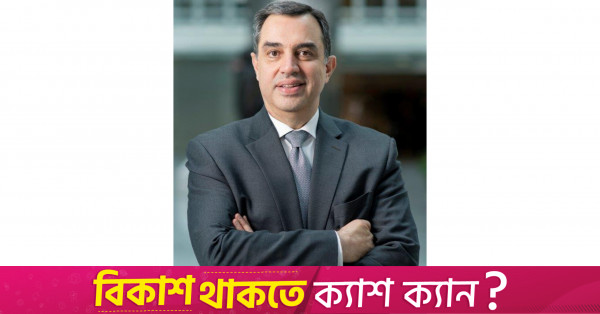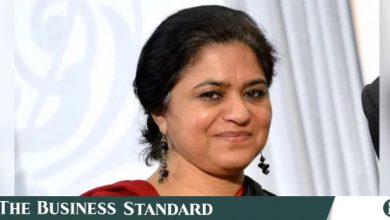We are bullish on Bangladesh’s investment potential: IFC South Asia Director Fakhoury


The International Finance Corporation is bullish on the investment potential of the Bangladesh economy, but the country needs reforms to unlock private sector growth, said Imad N Fakhoury, the organisation’s regional director for South Asia.
“I believe Bangladesh is on an economic breakthrough and the strategic reforms under implementation will set the stage to accelerate growth and become a hub for investments,” Fakhoury said in an exclusive interview with The Business Standard during his first Dhaka visit last week.
He said the IFC, the private sector arm of the World Bank Group, in its 50-year partnership with Bangladesh made a cumulative financing of $8 billion, and will continue supporting the country as it will need $600 billion in sustainable infrastructure investments by 2041.
Following the recent slowdown to below 5.5% GDP growth, the WB now forecasts it to get back to the 6% level in 2-3 years and sustain there, he said, adding that the track record and visible resilience of the Bangladesh economy is the reason behind it.
Reflecting on recent economic indicators, Fakhoury noted Bangladesh’s export growth of 2% year-on-year, reaching nearly $52 billion, alongside a 10% increase in remittances to $21 billion and a positive current account balance of $5.8 billion, a stark improvement from the previous year’s deficit of $3.3 billion.
“The International Monetary Fund (IMF) is expressing confidence. We also see things as a good sign,” he said. “One cannot ignore how Bangladesh has been one of the biggest success stories, in terms of really overcoming, making remarkable strides in poverty alleviation and sustaining economic growth for a long period.”
Bangladesh in right direction
To explain the rationales of IFC’s cautious optimism about the country, Fakhoury said the central bank is committed to continuing reforms to the financial sector which are a backbone of a healthy macroeconomy.
He also commended the country’s significant investments in logistics and infrastructure, including projects like the Padma Bridge, metro rail, elevated expressway, and the third terminal of Dhaka airport, all developed under public-private partnerships.
“I think these all positioning Bangladesh to become a premier investment hub,” he said.
Fakhoury’s advice is for Bangladesh to stay the course, continuing reforms, enhancing the ease of doing business, improving infrastructure to reduce business costs and increase efficiency, and ensuring a level playing field across all sectors.
“While fiscal constraints are common worldwide, Bangladesh must achieve its goals through ongoing reforms to promote private sector involvement in infrastructure and ensure stability and efficiency in financial and capital markets,” said the IFC director.
Observing reforms being implemented across various fronts—by the Bangladesh Bank and the government—and incorporating IMF recommendations into reform programmes, Fakhoury believes, “Bangladesh is on a turning trajectory and moving in the right direction that is being reflected in some macro numbers.”
“I am not an all optimistic or all pessimistic person,” he said, adding, “It is a journey that will take continued hard work and resilience.”
Private sector is critical factor
Fakhoury stressed the importance of enhancing the financial sector and capital markets: “Obviously, the private sector in Bangladesh is a key explainer and key driver of the success story of the country.”
Reflecting on his recent interactions with private sector companies across various industries and government officials, Fakhoury expressed being “truly inspired.”
Fakhoury said he met many public sector officials “who understand that reforms are the key for the future of Bangladesh and they understand that it is not easy to implement, but they are working diligently to stay the course.”
Besides, the capital market needs opportunity to really grow because it needs to provide the long term finances the economy needs, said Fakhoury.
He noted that tax incentives, diversification of the financial products and building confidence in professional services like credit rating will be important in developing the capital market.
Additionally, he stressed that a critical task for the private sector is to raise corporate governance standards, as firms adhering to high standards consistently demonstrate greater resilience and achieve more success.
Bangladesh’s next big sectors
Fakhoury mentioned that Bangladesh can sustain and grow its key sector, RMG, by diversifying into additional industries.
“We see great potential in pharmaceuticals, agribusiness and food processing, light manufacturing, construction materials, and digital technology sectors,” he said.
Highlighting the importance of decentralisation, he stressed the need for business growth beyond Dhaka and Chattogram. “This will require investments in physical, social, and economic infrastructure in secondary cities.”
With this, the success of RMG can be replicated in other sectors while continuing to improve the business environment, attract foreign investment, streamline trade practices, and enhance national standards.
He also stressed the importance of building a skilled workforce to meet the future demands of industries.
IFC’s focus in Bangladesh
Imad N Fakhoury said the IFC aligns its work with the Sustainable Development Goals. “All our efforts ultimately lead to improving services to citizens, enhancing job creation, and really continuing to create sustainable and inclusive growth.”
He also said their investments target critical infrastructure, sustainability, private sector competitiveness, and overall economic development.
Besides, the financial institution provides advisory services to both private sector companies and government counterparts,” said Fakhoury.
For instance, he said the IFC advised the government on Public-Private Partnership (PPP) arrangements for critical assets like Dhaka airport’s third terminal, Chattogram Port’s New Mooring container terminal, and Laldia Container Terminal.
In the energy sector, the IFC’s focus is on renewables to reduce fiscal pressures from imported fuel dependency, he said.
He mentioned that the IFC’s current portfolio in Bangladesh is over $800 million that are distributed in the financial, infrastructure, agriculture and services sectors while around 5% went to disruptive technology sectors.
“In manufacturing, we’ll continue supporting the RMG sector’s competitiveness and expansion, and diversify into retail sectors, leveraging the global consumer market’s growth,” Fakhoury added.




